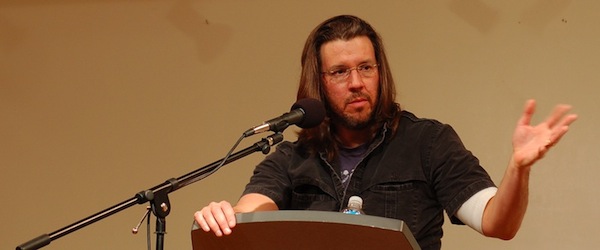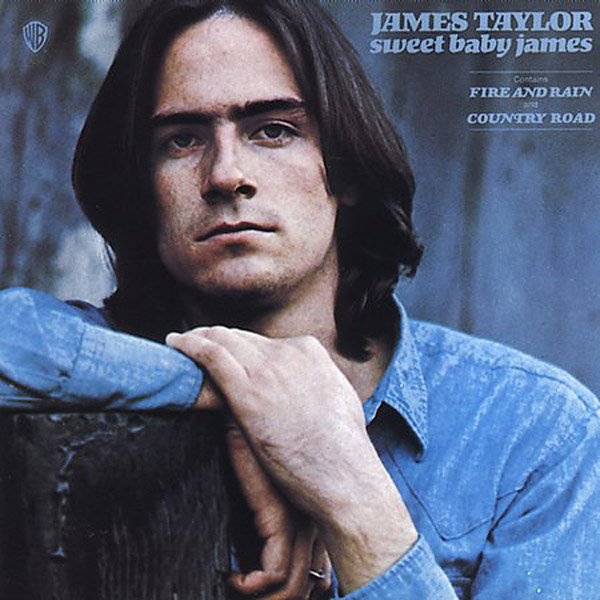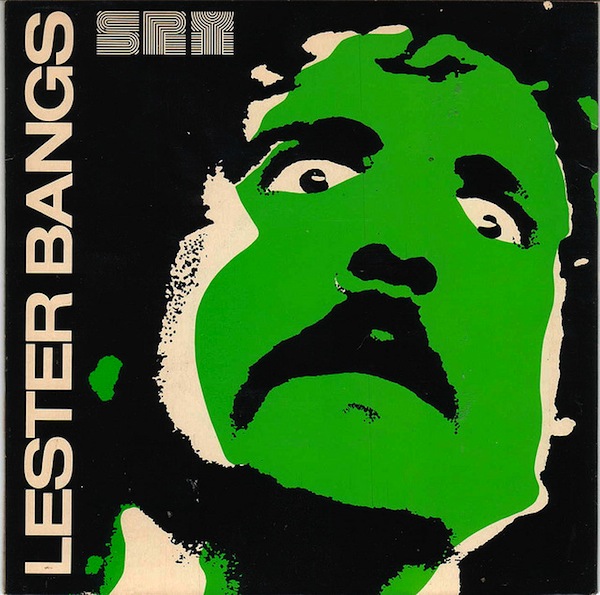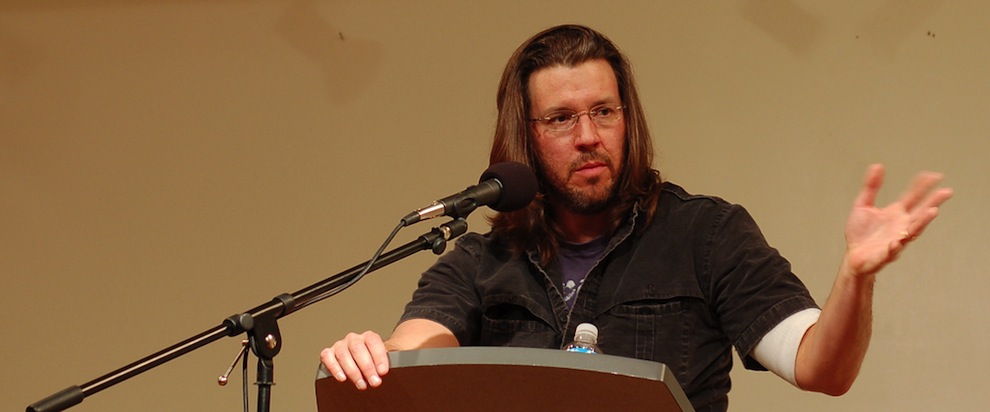
Editor’s Note: Last week in the Sunday New York Times, novelist and writer
Maud Newton had
a fascinating essay on the rhetorical devices of David Foster Wallace and how, she argues, they prefigured the voice of blogs and, more broadly, the Internet: slangy, glancing, afraid to make their case in a straightforward way. “In the Internet era,” Newton writes, “Wallace’s moves have been adopted and further slackerized by a legion of opinion-mongers who not only lack his quick mind but seem not to have mastered the idea that to make an argument, you must, amid all the tap-dancing and hedging, actually lodge an argument.”
Writers Maria Bustillos and David Roth adored and differed with different parts of Newton’s argument; here they respond, discursively, through conversation.
Maria Bustillos: Oh yes? I spent most of the last hour reading
Naked Lunch, sports fans will be relieved to hear.
Roth: Ballin’. Also I did some invoicing: I think you are winning this one. Any particular reason for spending your time in
William Burroughs’ needle-strewn unconscious?
Bustillos: YES. Newton claims that today’s online argot is attributable to Wallace, but that is manifestly not true. Nor are claims that Wallace invented the haute bro-speak, whatever, we need a name for this way of writing? I know because I like Wallace am of the pre-Cambrian era, and we were reading many of the same things as youngs.
Roth: That is where you have an advantage on me. Because my first experience of Wallace’s Type of Thing was David Foster Wallace. Also I can barely read.
Bustillos: Burroughs, Henry Miller, and also Tolkien, Sartre, Kafka, in the original cuneiform. But most of all, personal-influence-wise,
Lester Bangs of the hallowed
Creem Period. I have scared up a couple of quotes from the latter with which to illustrate my point.

Roth: And I didn’t really like it all that much at first. The Lester Bangs thing is interesting.
Let’s see these quotes. I’ve read some LB, and it’s pretty good, but it is all voice to me. Which is great, but different from DFW when he’s working at his best. I’d say that there’s something funny about someone getting so exercised about Badfinger or whatever, but I also spend a lot of time writing about how the Mets make me feel. So, continue.
Bustillos: His stuff was absurdly relevant and heartstrings-zapping, at the time. Here is part of his gorgeous essay, “
James Taylor Marked for Death“:
I could listen to Chicago or Santana anytime…I don’t think anybody as crass and commercial as they are could possibly be the Enemy. My spleen is reserved for Elton John, James Taylor, all the glory boys of I-Rock. I call it I-Rock, even though I just made up the name, because most of it is so relentlessly, involutedly egocentric that you finally actually stop hating the punk and just want to take the poor bastard out and get him a drink, and then kick his ass, preferably off a high cliff into the nearest ocean.
Matter of fact, if I ever get down to Carolina I’m gonna try to figure out a way to off James Taylor. Hate to come on like a Nazi, but if I hear one more Jesus-walking-the-boys-and-girls-down-a-Carolina-path-while-the-dilemma-of-existence-crashes-like-a-slab-of-hod-on-J.T.’s-shoulders song, I will drop everything (I got nothin’ to do here in California but drink beer and watch TV anyway) and hop the first Greyhound to Carolina for the signal satisfaction of breaking off a bottle of Ripple (he deserves no better, and I wish I could think of worse, but they’re all local brands) and twisting it into James Taylor’s guts until he expires in a spasm of adenoidal poesy.
EXTRA! TRAGEDY STRIKES ROCK! SUPERSTAR GORED BY DERANGED ROCK CRITIC!! “We made it,” gasped Lester Bangs as he was led by police from the bloody scene. “We won.” — Rolling Stone
Roth: There is definitely some proto-internet verve-unto-mania jumping off there. (Also you cannot say he’s afraid to make an argument, given that it ends with him actually murdering a seducto-folkie rake.)

Bustillos: Indeed James Taylor was once reckoned to be
surpassingly beautiful, in the manner of those days. Anyhoo, this essay expresses the frustration that certain cerebrally-inclined people feel with the ineffectuality of the “sensitive.” Bangs was so macho, in this way; a cerebralist, a satirist, but one full of blood and bile and whiskey. And the stylistic tics Newton talks about are all there as well; the slackerish logorrheic stoner moralist suffering in an unjust world, and Bangs too was this very careful, deliberate writer and very scholarly, underneath…the all-caps outrage, the jokes gathered from every corner of the culture, you know, this way of writing that to us was so freaking virtuoso, heavenly. Here is another quote from the same essay:
Number one, everybody should realize that all this “art” and “bop” and “rock-‘n’-roll” and whatever is all just a joke and a mistake, just a hunka foolishness so stop treating it with any seriousness or respect at all and just recognize the fact that it’s nothing but a Wham-O toy to bash around as you please in the nursery, it’s nothing but a goddam Bonusburger so just gobble the stupid thing and burp and go for the next one tomorrow; and don’t worry about the fact that it’s a joke and a mistake and a bunch of foolishness as if that’s gonna cause people to disregard it and do it in or let it dry up and die, because it’s the strongest, most resilient, most invincible Superjoke in history, nothing could possibly destroy it ever, and the reason for that is precisely that it is a joke, mistake, foolishness. The first mistake of Art is to assume that it’s serious. I could even be an asshole here and say that “Nothing is true; everything is permitted,” which is true as a matter of fact, but people might get the wrong idea. What’s truest is that you cannot enslave a fool.
Roth: I didn’t, but that makes sense. I guess the way you get from there to DFW is more schooling, more nuance, and a different flavor of self-regard. If the wince factor with Bangs is the badass-ish no-bullshit intellectual performance, the one that Newton pins on Wallace — a self-effacement that aggrandizes and obfuscates — is kind of the same self-stylization turned upside down.
Bustillos: They had this weird elegance in common. The equal devotion to high and low.
Roth: And while the pyrotechnics were pitched at a different volume, there was indeed something show-offy about the way DFW did DFW.
Bustillos: Deliberately show-offy, beautifully and delightfully show-offy, like watching a great skateboarder or breakdancer.
Roth: If only someone had coined a phrase to describe that combination of dorkiness and machismo.
Roth: I like your comparisons. Because you can make the case that — as with the breakdancer, say — a certain type of writerly show-offiness inheres in the task itself. If you’re going to write something so that people will read it, then you might as well WRITE it, right? And that can be beautiful words or empathy or incisiveness or perfect pitch or whatever. Even trying not to do that is showing off — look how modest and beyond-adjectives I am.
Eggers, in his recent stuff, does this, which is funny because he made his name with the tap-dancing.
Bustillos: Haha! Yeah. The question is, do you buy it at the end as a reader, are you coming along for the ride? This is personal, obviously, but for Bangs and much later for Wallace, yes, resoundingly, I’m buying the whole story, the fake-badass, the persona, the man behind the curtain, the super-posturing, kidding-around “intellectual” and the real one, the serious mind underneath. So basically I am sorry, well NO I am not sorry, I still want to write like Lester Bangs and I always will.

Roth: The thing with Bangs that jumps out at me as internet-anticipatory is that he’s writing in that ostentatiously naturalistic voice, while still putting on a persona. Which was not new, maybe, but which has that combination of simple tough-guy stuff and show-offy syntax and construction. Like of course he’d take a BUS to Carolina, you think? He’s on the bus with a $1 bottle of wine.
Bustillos: And murder in his heart.
Roth: Kind of goes with the “on a bus with a $1 bottle of wine,” but yeah.
Bustillos: Well if it were me, I would have forgotten why I got on the bus by the time I got through the Ripple, I guess.
Roth: You are much smaller than Lester Bangs was, and also I sense you’d be drinking better wine.

Bustillos: (snort.) What this kind of writing comes from, really, is a deep frustration with the establishment. You have this person who can’t be contained in establishment methods or institutions, a status quo that is not speaking to him.
Hang the blessed DJ. Nothing more complicated than that.
Wallace tailored his language very exactly to his meaning. The language may have been sprawling, but for a reason; it was an exact representation of both his thought and his desire for delivering that thought to you, the reader. This is a deliberate strategy. What I think Newton missed is that grabbing all these words and voices and ways of expressing what you want to say from legalese, from advertising, from television, there is a laser-keen purpose to that, which is to make yourself understood outside of the conventional parameters. Not liked, but understood.
Roth: Right: it’s a fireworks show, but it’s also mimetic insofar as he’s turning all these something-from-everything thoughts he’s trying to express into sentences that are more or less as complicated, and comprised of the same weird parts. The thing with the Newton essay that falls short for me — and there’s a kind of funny internal self-critique in this — is the argument itself. Or the idea that there’s an argument like in the sense of a thing-to-dispute. I’m not an editor at the Times, of course, but just identifying the source of The Way The Internet Writes — and I am, and you are, and plenty of other people are borrowing from that voice — is cool to me. I’d want to read about that and I really dug the parts where she wrote about that.
But the idea that somehow everyone is so awash in their own qualifiers and voice-iness that they can’t make an argument anymore…I don’t know that that’s somehow more true for someone in that voice than anyone writing any other way. And I don’t get the sense even that she was feeling that particular angle as hard. I guess that’s the editorial influence, maybe, the find-a-problem-and-then-solve-it bit. But it’s not inherently a problem that people are trying to get their thoughts out in something more or less approximating those thoughts’ own syntax, and I don’t know that appending all those qualifiers is in some way a weakness. Unless it’s done weakly, but obviously on that.
Bustillos: YES to the qualifiers thing, the desire to never be caught out, caginess, but that has always been true, it’s just human.
Roth: Wallace wasn’t the first writer to embody all that, obviously, although I think he did so more clearly and effectively for me than anyone I’ve read. Maybe because his thoughts are like better-informed versions of thoughts I might have myself.
Bustillos: On that, here is
David Lipsky on reading Wallace: “Like hearing for the first time the brain voice of everybody I knew: Here was how we all talked, experienced, thought. It was like smelling the damp in the air, seeing the first flash from a storm a mile away.”

Roth: That’s very good. And when DFW is a problem for me — which is basically
The Novels — it’s because that voice is too suffocating in its cleverness.
Bustillos: I do agree about Wallace tripping over his own feet, sometimes. (At some point I want to talk about all the things I LOVED in Newton’s essay.)
Roth: We should do that. Because I admired it a lot, and it addressed something real.
I don’t want to put any of this on an editor, but I know she needed A Problem and A Solution to make it an essay. But I think that ultimately it would’ve been better if it had been a diagnosis without the prescription. Because the diagnosis is so incredibly on point.
Bustillos: Right. The “conclusion” is particularly weak — I thought “wanting to be liked” could scarcely have been a problem for the author of Infinite Jest, one of literature’s most infuriating novels. People are still flinging that thing across the room in a spitting rage. BUT one million gold stars for the phrase “slangy approachability”, and for the observation that Wallace’s rhetoric is “mannered and limited in its own way.” All forms of not playing are playing, in short.
Roth: Being protective of DFW has a lot to do with how I respond to essays like this, too, by the way. Which is weird because he does not need my pipsqueaky no-name ass sticking up for him.
Bustillos: The main thing I’m protective of is this: people will tell you about this or that author or artist, it is full of shit, pretentious, it doesn’t mean anything, it sucks blah blah. Like, I get that way when people are all, oh, Nabokov is so clever-clever. I’m not asking that anyone else respond to Wallace or to Nabokov the way I do. They can go ahead and hate it! I welcome their hate. But I’m protecting my own response, which is just what it is. If it succeeds for one reader, that is all that can ever be asked of any writing.
Roth: You and I kind of have to think that, but I do think that. And it’s totally legitimate not to like something other people like. Or even to be annoyed by it.
Bustillos: Yes, and Newton has articulated the infuriating things about Wallace better than anyone else has, so far. That’s why I loved her essay so much. Adore = 11, and differ = 11.
Roth: Yeah, that’s the other side of the “protective” thing. I know him insofar as I like his writing a lot and it reflects some values I share/aspire to. But it’d be foolish to imagine that he was somehow Too Good For This World or Saw Too Much or whatever.
Bustillos: Christ YES. It is actually a little bit unnerving how it took someone that messed up to make me care about modern fiction again.
Roth: And to make a lot of other people who are writing fiction care about it, too! He sort of led the way out of (what seems to me in retrospect, because I was like eight when everyone was living there) a cul de sac. Even if he wasn’t exactly blazing a trail you’d want to follow, or be able to follow. I liked
the Geoff Dyer essay that Maud linked to, where he confesses to being exhausted by DFW. I get that.
Bustillos: Note in the Dyer essay how even he is paradoxically liberated by Wallace’s rhetorical techniques, and he is scarcely an uptight guy to start with. If he were talking about
Sven Birkerts would he have said anything like “phat loquacity”? “Bug the crap out of me?” And this is refreshing and GREAT.
Roth: And some of DFW’s fanatical erudition — the academic language and high-dollar syntax and all that — had the feel of putting the reader in his/her place (that is, Indian-style on the floor, looking up at the dude in a bandana trying to tell you the story in a way you might understand) when it didn’t work.
Bustillos: YES YES YES. He was such a schoolmarm.
Roth: And that’s the macho part, weirdly. Also definitely the dorky part.
Bustillos: Then he would backtrack over that and go oh, I really don’t know all those things, I just cribbed it all from the
DSM-IV or whatever that thing is called.
Roth: Which could be annoying of him! That’s really show-offy. Building these giant edifices and then writing rude-ish graffiti on them…you need to be good as hell to do that. If there’s a problem with the influence of DFW on anything it’s that trying to emulate what he does is a good way to wind up under a bunch of rubble with spray paint all over you.
If there’s really anything we mortals can use of DFW’s arsenal/example I think it’s to take the stylistics as needed/possible. Try to take the communion with the reader. And then for goodness sake take the rest as easy as you can, because you have to work and the world is hard.
Bustillos: True. To me, Wallace’s real weakness was the fact that he was falling apart inside; he was in no way at peace with the idea that we are alone in a hostile universe or whatever.
Roth: Well, it makes me sad. It makes everyone sad. I don’t know that I was able to sense how sad it made him.
Bustillos: Sometimes, we’re saddened by it. But really, it needn’t make us dwell in hatred, or self-hatred, or terror. We can say no, we’re alive now and together, and that is as Wallace himself said, what writing is for.
I was arguing with him at a reading this one time, about this solipsism, and how good writing is able to break it.
He’d said something about the one-to-one relationship between writer and reader, how ideally the reader (irritatingly, always “she”) would feel less alone. And when it was Question Time I said to him no, I take issue with this one-to-one thing, because look at this gathering? Which is more like one-to-many, because everyone who is here has come in a shared response to your work, which made me feel less alone than any writer since Henry Fielding, I never thought I’d run across another such novelist. And he smiled and said, “Some people like it, some people don’t.”
Roth: “Some people think it’s false modesty, some people don’t.” But you’d have to be a lot smarter than me to argue with that on its merits.
Bustillos: This brings us back to Maud Newton! “As the Times critic A. O. Scott has observed, Wallace ‘wants to be at once earnest and ironical, sensitive and cerebral, lisible and scriptible, R&D and R&R, straight man and clown, grifter and mark.'” YES. Which is just what I love about him, and just what they don’t.
Roth: Who wouldn’t want to be all that? Being only one thing — or one of each of those binaries — is a great way to be dull, for one thing.
Bustillos: And we are all all of these things.
Roth: Right! Trying to write that way, or in a way that acknowledges at least that full spectrum of want, doesn’t strike me as trying — disingenuously or not — to be liked. It strikes me as trying to write in a way that more accurately reflects your actual self, which is inevitably all those things.
Bustillos: That looks like the perfect conclusion, to me.
Roth: Well, we obviously should conclude sometime, so sure.
Bustillos: Well, we can pause.
David Foster Wallace photo by Steve Rhodes and photo of a box of Ripple by Rochelle Hartman used under Creative Commons licenses.






